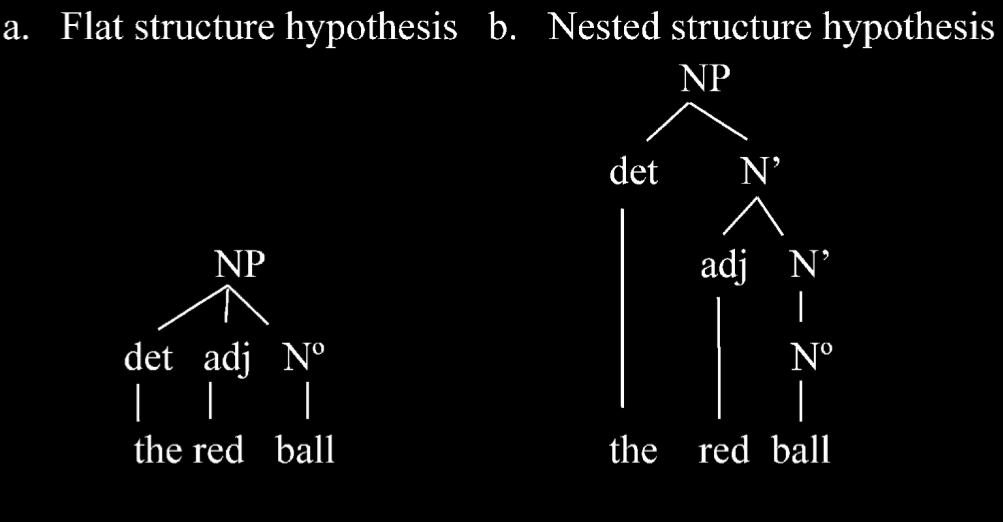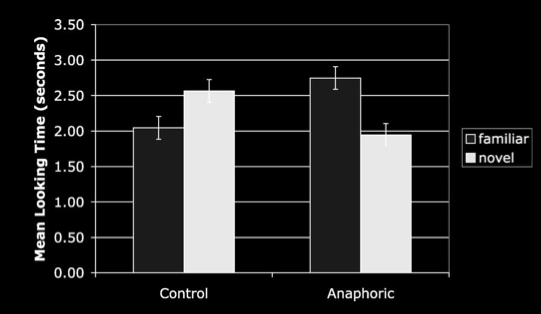Click here and press the right key for the next slide.
(This may not work on mobile or ipad. You can try using chrome or firefox, but even that may fail. Sorry.)
also ...
Press the left key to go backwards (or swipe right)
Press n to toggle whether notes are shown (or add '?notes' to the url before the #)
Press m or double tap to slide thumbnails (menu)
Press ? at any time to show the keyboard shortcuts
Syntax / Innateness

Syntax / Innateness
[email protected]
‘I’ll play with this red ball and you can play with that one.’
core knowledge of syntax is innate?
detecting sentences
The turnip of shapely knowing isn't yet buttressed by death.
*The buttressed turnip shapely knowing yet isn't of by death.
transforming sentences
That is the tiger who is my friend.
The tiger who is my friend is eating all the food.
Is that the tiger who is your friend?
Is the tiger who is your friend eating all the food?
core knowledge of syntax is innate?
core knowledge of syntax is innate?
| KNOWLEDGE | yes | no |
| Is it a mental state? | Williamson (2000) | Hyman (1999) |
| Knowing entails believing? | Rose & Schaffer (2013) | Radford (1966) |
| Is it a form of belief? | Sosa (2007) | Williamson (2000) |
| Valuable for action? | Plato’s Meno | Kaplan (1985) |
| Is humanly attainable? | [others] | Unger (1975) |
| Depends on context? | Lewis (1996) | [lots] |
Philosophical Folk Psychology
‘epistemic case intuitions are generated by [...] folk psychology’
Nagel (2012, p. 510)
Three Assumptions about Knowledge
- subjects can show some symptoms of knowledge without having knowledge
- knowledge is inferentially integrate with belief, intention and the rest
- knowledge can feature in practical reasoning
core knowledge of syntax is innate?
We know that ‘implicit statistical learning is implicated’
(Kidd, 2012, p. 180).
But does learning syntax also ever depend on innate capacties?
Poverty of Theory Argument
‘There would seem not to be enough ambient information available to account for the functional architecture that minds are found to have’
(Fodor, 1983, p. 35).
the red ball
‘I’ll play with this red ball and you can play with that one.’

Lidz et al (2003)
- ‘red ball’ is a constituent on (b) but not on (a)
- anaphoric pronouns can only refer to constituents
- In the sentence ‘I’ll play with this red ball and you can play with that one.’, the word ‘one’ is an anaphoric prononun that refers to ‘red ball’ (not just ball).(Lidz et al., 2003; Lidz & Waxman, 2004).
infants?
| Look, a yellow bottle! | control: What do you see now? test: Do you see another one? | |
| [yellow bottle] | [yellow bottle] | [blue bottle] |
Lidz et al (2003)

Lidz et al (2003, figure 1)
From 18 months of age or earlier, infants represent the syntax of noun phrases in much the way adults do.
But are these representations innate?
‘Universal Grammar is [...] is the prespecification in the brain that permits the learning of language to take place. So the grammar-acquiring capacity is what Chomsky claims is innate’
(Jackendoff, 2003, p. 72).
‘Universal Grammar [...] must [...] prespecify the possibilities for derivational rules (if any) and for constraints in syntax, not to mention many important facets of phonological structure’
(Jackendoff, 2003, p. 78).
From 18 months of age or earlier, infants represent the syntax of noun phrases in much the way adults do.
But are these representations innate?
Poverty of stimulus argument
- Human infants acquire X.
- To acquire X by data-driven learning you'd need this Crucial Evidence.
- But infants lack this Crucial Evidence for X.
- So human infants do not acquire X by data-driven learning.
- But all acquisition is either data-driven or innately-primed learning.
- So human infants acquire X by innately-primed learning .
compare Pullum & Scholz 2002, p. 18
‘the APS [argument from the poverty of stimulus] still awaits even a single good supporting example’
Pullum & Scholz 2002, p. 47
What is innate in humans?
- What evidence is there?
- What does the evidence show is innate?
- Type: knowledge, core knowledge, modules, concepts, abilities, dispositions ...
- Content: e.g. universal grammar?
Follow the evidence!
Something syntax-ish is probably innate.
other domains could be similiar
- objects (Spelke’s Principles of Object Perception)
- minds (Carruthers on theory of mind)
- ethics (Mikhail’s language analogy)